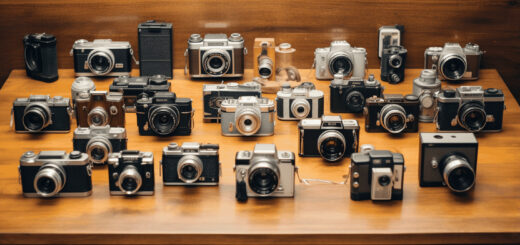Best DSLR Camera for Beginners: A Comprehensive Guide
If you are new to the world of photography and are looking for the best DSLR camera to kickstart your journey, then you have come to the right place. This comprehensive guide will help you choose the perfect DSLR camera for your needs while considering various factors such as price, features, and ease of use. Without further ado, let’s dive into the world of DSLR cameras for beginners.
Table of Contents
- Features to Consider When Buying a DSLR Camera
- Top 5 DSLR Cameras for Beginners
- Understanding Lenses for DSLR Cameras
- Essential Accessories for DSLR Cameras
- Tips for DSLR Photography Beginners
- Conclusion
Features to Consider When Buying a DSLR Camera
Several factors come into play when choosing a DSLR camera, and it is essential to understand them. Here are some essential features that you should consider when buying a DSLR camera:
Sensor Size
Sensor size is a critical factor in determining the quality of your images. Generally, DSLR cameras have either an APS-C sensor or a full-frame sensor. Full-frame sensors capture more detail and deliver better low-light performance, but they are also more expensive. APS-C sensors are more affordable, have a smaller size, and provide excellent image quality for most beginners.
Megapixels
Many people believe that having more megapixels means a better camera, but this isn’t always true. The quality of your images depends on various factors, such as sensor size, lenses, and image processing capabilities. A camera with 16-24 megapixels is sufficient for beginners and will allow for large prints and cropping without significant loss of detail.
Autofocus System
An efficient autofocus system can capture sharp images, making it an essential factor for beginners. Cameras with multiple autofocus points give you more flexibility in choosing focus areas. Features like cross-type autofocus points and face detection may also help you capture sharp images.
Video Capabilities
If videography is your forte, consider a camera with Full HD, 4K, or 8K video capabilities. Also, look for features like image stabilization and high frame rates for slow-motion recording.
Budget
Consider your budget when choosing a camera. Affordable options with fewer features are available for beginners who don’t need professional-level cameras. As you progress in your photography journey, you can invest in a more expensive camera with advanced features.
Top 5 DSLR Cameras for Beginners
Here are our top picks for the best DSLR cameras that are beginner-friendly:
- Canon EOS Rebel T8i
- Nikon D5600
- Sony Alpha a68
- Pentax K-70
- Canon EOS 90D
Brief descriptions and the key features of these top 5 DSLR cameras for beginners are provided below.
Canon EOS Rebel T8i
The Canon EOS Rebel T8i is a versatile camera with a 24.1-megapixel APS-C sensor. With fast autofocus, customizable settings, and 4K video capability, it is an excellent option for beginners. Its Vari-angle touchscreen LCD also allows for easy navigation and flexible shooting.
Nikon D5600
The Nikon D5600 features a 24.2-megapixel APS-C sensor with an impressive autofocus system, making it a great choice for beginners. It has a user-friendly interface and offers continuous shooting at 5 frames per second. The camera also supports Full HD video recording and has a variety of connectivity options.
Sony Alpha a68
Sony Alpha a68 is an entry-level DSLR camera with a 24.2-megapixel APS-C sensor. It offers a 79-point autofocus system with 15 cross-type points, ensuring sharp images even in challenging lighting situations. Additionally, it has image stabilization and Full HD video capabilities.
Pentax K-70
The Pentax K-70 is a weather-resistant camera with a 24.2-megapixel APS-C sensor, perfect for outdoor enthusiasts. This camera offers a high dynamic range and excellent low-light performance with its ISO range of up to 102,400. It also features in-body image stabilization and Full HD video recording capabilities.
Canon EOS 90D
The Canon EOS 90D is a versatile and powerful camera with a 32.5-megapixel APS-C sensor. Its Dual Pixel autofocus system offers quick and accurate focusing. It also boasts 4K video recording, built-in Wi-Fi and Bluetooth connectivity, and a tilt-swivel touchscreen LCD.
Understanding Lenses for DSLR Cameras
As a beginner, choosing the right lens for your camera can be confusing. Lenses vary in their focal lengths and are generally divided into three categories: wide-angle lenses, standard lenses, and telephoto lenses. Here is a brief explanation of these types:
Wide-Angle Lenses
Wide-angle lenses offer a broad field of view and are suitable for landscape photography, architecture, and group photos. They usually have a focal length of 35mm or less.
Standard Lenses
Standard lenses have a focal length of approximately 50mm and offer a natural perspective without any distortion. They are excellent for street photography, portraits, and everyday use.
Telephoto Lenses
Telephoto lenses typically have a focal length of 70mm or more and are perfect for capturing distant subjects such as wildlife, sports, and events. They can also be used for creating professional-looking portraits with a shallow depth of field.
Essential Accessories for DSLR Cameras
Besides the camera and lens, a few accessories can enhance your photography experience. Here are some essential accessories to consider:
- Tripod: A tripod provides stability and helps you eliminate camera shake, especially when shooting in low light, using long shutter speeds, or capturing landscapes.
- Camera Bag: A good quality camera bag will protect your camera and lenses from dust, scratches, and damage while providing easy access to your gear.
- Memory Card: Invest in a high-capacity memory card that can accommodate high-resolution images and videos.
- Extra Batteries: Having extra batteries ensures that you are always ready to capture memories without worrying about your camera running out of power.
- Cleaning Kit: A cleaning kit with a lens pen, cleaning solution, and a microfiber cloth helps keep your camera and lenses clean and free from dirt, fingerprints, and smudges.
Tips for DSLR Photography Beginners
To fully utilize your DSLR camera and attain better results, consider these tips:
- Learn the Rules of Composition: Familiarize yourself with basic composition techniques like the Rule of Thirds, leading lines, and symmetry to create more visually appealing images.
- Understanding Camera Modes: Master the camera modes, such as Aperture Priority, Shutter Priority, and Manual mode, to gain better control over your exposure settings.
- Shoot in RAW Format: Capture your images in RAW format to preserve more image details and facilitate better post-processing outcomes.
- Practice: Practice with your camera and various settings to learn its strengths and weaknesses. This helps you develop a better understanding of how to achieve the results you desire.
Conclusion
Choosing the right DSLR camera for beginners can be challenging, but understanding the essential features and considering your requirements will lead you to the perfect option. Our top 5 picks for beginner DSLR cameras, the different types of lenses, essential accessories, and our tips for beginners will help you on your journey to becoming a skilled photographer.



